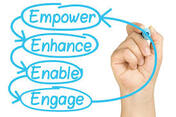 Get in Sync with Your Child: The Four Stages of Parenting Parenting is the toughest, most consequential job for which most of us never have any training. By practice and experience, as adults, we all tend to parent just like our parents, or just opposite our parents. That’s just shy of the ole trial and error method. In my first book, Teachable Moments: Building Blocks of Christian Parenting, I provide such a source book for effective parenting. In this book, I go into greater length about active listening, when things are not going so well, and I elaborate on the four stages of parenting, when things are going well in your family. Okay, enough of plugging the product (Oh, you can find my book on amazonbooks.com, Okay, that’s all). Mikey, age 7, came in from the back yard, slamming the screen door to the kitchen. He growled and stomped toward his bedroom. “I hate Devon,” he screamed as he fell across his bed. “Uh oh, here we go again,” Amber thought, as she dried her hands on a kitchen towel. “What’s happened now?” She hurried to her son’s room. Here is a choice point for Amber. She could be frustrated with Mikey’s behavior and fire back something like, “Now, you just hold on, young man. You don’t go slamming things in this house.” Accurate, but helpful? She could have said, “You and Devon have been such good friends. Don’t you think you should go apologize to him for being mean?” Again, a potentially positive outcome, but timely at this point? Amber chose to go into Mikey’s room, gently sit on his bed next to his curled position facing away from her, and softly rub his back. She waited, saying nothing for several minutes while Mikey cried and then settled. “I’m so sorry, baby.” She soothed. “Things got out of hand, huh? And you got very upset.” Amber used her active listening to help her son sort out his feelings himself. She used a variety of feeling words with him and emphasized those with which he agreed. After he settled down, she asked, “So, what do you think you could do now?” If he is stumped, she gets his permission to share her thoughts on his upset. Active listening is a parental superpower! All parents know how to help their child when they have a physical fever. Aspirin, cold compress, chicken soup, bedrest. Active listening is your go-to response when your child has an emotional fever. Also, most children are both stunned and impressed when, after they’ve settled, you ask permission to talk, saying something like “So, I have some thoughts about what we’ve been talking about. Wanna hear them?” When all is well in the family, no fevers, physical or emotional, and everybody is trucking along, be aware of the parenting stage each of your children are in. There are four parenting stages. You will best connect and your words will have the most impact if they match the appropriate age of your child. From birth to about age 5, parents want to use hands-on parenting. You can’t leave an infant to feed herself. You show a toddler how to put stuffed animals in his toy chest. You keep your hand on her bike seat, as she learns to balance and ride her bike. From age 6 to 10, parents want to use directed parenting. You help her think through how she wants a playdate to go. You are in the room to answer questions and guide him as he does his homework. You show him how to weed the garden, prune the plants, and pick the veggies for the supper table. From ages 11-17, parents want to use advice-based parenting. Tweenagers, ages 10-12, think they know everything but don’t. Give cautionary tales, fill in their knowledge gaps, tolerate the eye-rolls. Young teens, ages 13-17, know they know everything and you know nothing. Tolerate their collective attitude, give them room to fail but pick them up and help them re-calculate. From age 18 to forever, parents want to use consultative parenting. You have knowledge and experience being an adult. You can be their role model, mentor, confidante. When you see them struggling, ask if you can help. Wait for permission and then give them what you know. Back off and let them do what they want/can with their new knowledge. This progression of parenting stages helps you know where you and your children are in their development. Crossing stages can be at least confusing and possibly overwhelming to your child. Pace. Ask for feedback. Help them learn how to grow. Successful parenting is achieved when your child enters adulthood as an independent, responsible, socially conscious individual.
0 Comments
Leave a Reply. |
Archives
January 2024
Categories
All
|

 RSS Feed
RSS Feed
